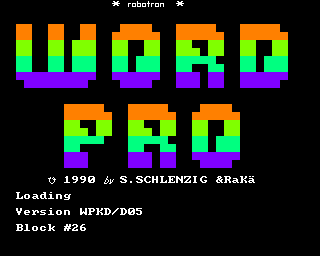CFOG's PIP, November 1987, Volume 6 No. 1, Whole No. 61, page 10
How Much Does Gramattik Help?
by Steve Lucius
How much help on the above article on Grammatik software did I get from it? First I wrote the rough draft and ran it through a spelling checker, then to Grammatik I. After that I ran it through Grammatik II, after that made my corrections. The list below shows what each found.
GRAMMATIK I
Grammatik I has problems with WordStar dot commands in that it tries to interpret them as words and evaluate them. It told me I had many erroneous capitalization (first word of sentence) and punctuation (starting a sentence with a period) errors because of this. When I tried to suppress all punctuation and capitalization error reporting it froze up. A better remedy for this problem is convert your file to an ASCII text file without dot commands, using either WordStar or a utility. (With WS4 print the file using a printer driver called ASCII, with other versions use MailMerge to mergeprint to a file.)
On the plus side of punctuation it did catch several mistakes that I made.
It caught a word I had typed twice and also complained about my use of the words "very" and "quite" describing them as "vague adverbs." It also felt that the phrase "a lot of" was a "wordy phrase."
Grammatik's other program profile produced a listing of words used in the article and showing their frequency of usage. It included short words such as articles that I don't care about. (Did you know I used the word "the" 52 times? Did you care?) It also threw in parts of WordStar dot commands. On the positive side once these problems were ignored the resulting list was useful.
GRAMMATIK II
Grammatik II caught all the punctuation errors that I made, and knows enough about WordStar dot commands that it doesn't tag them as errors.
It also caught the word that I typed twice.
Grammatik II doesn't like passive voice. It flagged me for 7 uses of passive voice. The accompanying manual says that passive voice should be used sparingly. For those like myself who ignored this part of English the previous sentence is in passive voice. If it were rewritten into active voice it would read "The accompanying manual says to use passive voice sparingly."
It also found three vague adverbs but not the same three that version I found. In addition it found a phrase that was "long winded or wordy." (This phrase was "at the same time". It seems the two programs share structure but not the same dictionary.) Grammatik II also issued a few warnings on words that were subject to misuse.
Grammatik produces graphs comparing the article to other references. It found it to be a 66 on the reading ease scale with a grade level of 9th grade. It compares this to a Hemingway short story at 4th grade, the Gettysburg address and a life insurance policy at 11th grade.
Grading words per sentence the article has more words than a Hemingway short story but fewer than the Gettysburg address or an insurance policy.
The summary also wasn't too unhappy about 14% of my sentences being in passive voice and thought that my number of letters per word made the article easier to read than a life insurance policy but harder to read than the other two references.
The word usage listing has sense enough not to bother with articles. The word "is" was the most used word.
In summary either program can be very useful in getting rid of those errors that can escape several proof readers in your office or home only to be caught by a sharp eyed customer or teacher.

